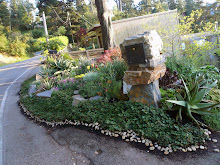
The Hellebores are considered to be one of our welcome harborings of spring, and as such are often seen blooming in the snow. They can naturalize rather nicely in a woodland setting or if given the right growing conditions, and tend to be very long lived perennials. Prefers a shady position.
Once planted, the thick tough roots prefer to be left alone and undisturbed, except for maybe an occasional top-dressing of well rotted manure or compost. It is better to start out with pot-grown plants, but they say you can propagate them by root divisions of 3 in the fall.
Flowers are usually nodding, either bell or cup-shaped. They have a very noticeable central boss of stamens, ringed by rounded petaloid sepals. These sepals often persist for several weeks after the stamens are shed.
The branched flower stems have leafy bracts and small clusters of 2 inch flower. Colors can range from pale green through white, pink, maroon to dark purple, often with some beautiful speckling inside.
Their dark green and somewhat handsome leaves are leathery and palmately divided. The basal leaves can be up to 1 inch across, with anywhere from 5-11 leaflets, that are often edged with numerous fine teeth.
CULTIVARS, SPECIES & VARIETIES
Helleborus argutifolius
Helleborus atrorubens
Helleborus corsicus
Helleborus cyclophyllus
Helleborus foetidus
Helleborus guttatus
Helleborus lividus
Helleborus niger
Helleborus niger 'Altifolius'
Helleborus niger 'Potters Wheel'
Helleborus purpurascens
Helleborus viridis
Helleborus x nigericors
Helleborus x sternii

No comments:
Post a Comment